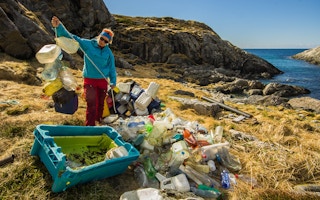Versatile, affordable and ever-present, plastics have been essential to keeping hospitals running and protecting our frontline workers during the Covid-19 pandemic. They’re the bedrock of medical equipment and protective gear.
They’re even at the heart of innovative cross-industry collaborations to combat the virus; the luxury auto brand Ferrari, for instance, announced it will produce the thermoplastic components needed for respiratory valves, while Apple designed plastic face shields for medical professionals and is shipping millions of them across the United States every week.
But that’s only part of the bigger story. The devastating impact of Covid-19 and the extraordinary measures taken around the world have led to some tough questions for those working to combat plastic pollution.
How do we support those in our community hit hardest by the outbreak? Can the recycling industry survive Covid-19? Can we still achieve a circular economy for plastics? And, how can we keep our work going in a world in which “normal” still seems so far away?
Workers in the informal economy – specifically waste pickers – are particularly vulnerable to this crisis.
Informal sector waste pickers have long worked on the frontlines of efforts to keep cities and villages free from waste and litter. In Indonesia, for instance, the informal sector is the backbone of plastic waste management, collecting 1 million tonnes of plastic waste per year, 70 per cent of which is recycled.
Yet with a general lack of job security or health benefits, waste pickers are also facing unprecedented threats to their safety and their livelihoods.
“
Plummeting oil prices globally have led to a dramatic decrease in the value of plastics, and companies are making tough decisions about whether recycling is still an economically viable option.
“With Covid-19, it’s getting even more difficult for us,” Pris Polly, chairman of IPI, Indonesia’s union of 3.7 million waste pickers, recently shared with us. “Waste pickers who try to continue to find scraps do so because they have to work. If they don’t work, then they won’t be able to survive. We have no protection. We cannot survive at home. We don’t have savings like other citizens or workers.”
In Indonesia, private sector partners are delivering urgently needed resources to waste pickers. Water utility company PAM Jaya has provided handwashing facilities and masks, Pris Polly says, while Unilever is supplying soap.
But looking at the bigger picture, it’s clear that governments and businesses must explicitly and thoughtfully build support for waste pickers into their Covid-19 responses, by supplying them with personal protective equipment, connecting them with food and community resources and ensuring access to formal healthcare systems.
Companies are making difficult decisions about their bottom lines – and efforts to reduce plastic waste could be on the chopping block.
Plummeting oil prices globally have led to a dramatic decrease in the value of plastics, and companies are making tough decisions about whether recycling is still an economically viable option. This means many consumer brands, such as beverage companies, could have difficulty meeting previous commitments to adopt more sustainable practices and replace all or portions of their products with recycled plastic.
As a result, we could see companies increasingly return to producing virgin, or new, plastic – adding to the unsustainable levels of plastic production and mismanaged waste we were already seeing before the pandemic.
The recycling industry is also hurting. A recent update from a recycler in Asia reported “financial distress” for the industry as a result of citywide lockdowns, social distancing measures and limited operational capacities. While some projections point to a steady recovery for the plastic waste management industry as lockdowns lift and demand for waste collection returns, we will be watching this space closely for developments in the months and years to come.
The current increase in single-use plastics is understandable, but we also need to think about our planet’s long-term health.
California recently became one of the latest states to lift its ban on single-use plastic bags, while New York, New Jersey and the United Kingdom have postponed bans set to go into effect this year.
These new orders were issued on the assumption that plastic materials are less likely to carry the virus, but research actually suggests the opposite: a study earlier this month found that the virus can live up to 24 hours on paper, cardboard and fabrics, compared to up to 72 hours on plastics and other hard, shiny surfaces.
It’s important to acknowledge that we live in a new and unfamiliar reality. Individuals and families are making difficult and often necessary changes to the way they live and consume for the benefit of their safety and wellbeing.
As restaurants and shops temporarily close and governments issue “shelter-at-home” directives, many citizens are ordering food deliveries, purchasing groceries online and switching to disposable utensils for convenience and reassurance.
Managing this increase in single-use plastic waste will be a challenge for governments – even more so in many developing nations, where mismanaged waste aggregates in town centers or leaks into rivers and oceans, thus triggering new public health crises.
Covid-19 has illuminated a host of structural issues, including plastic pollution, that have been left simmering on the back burner for decades.
As we navigate this new reality together, consumers whose circumstances allow for it should begin to reshape how they think about plastic pollution. It’s a real and present crisis we can stop in its tracks right now – if we make choices that lead to a cleaner and more sustainable future.
Some things consumers can do include:
- Shopping at bulk stores or shops with refill models – which not only supports small businesses but also significantly reduces plastic usage.
- Supporting informal sector waste pickers by making a donation to one of the campaigns here.
- Using reusable shopping bags and advocating for local governments to reconsider lifting restrictions on single-use plastics.
- Responsibly discarding disposable products like masks and gloves through formal waste collection systems, rather than littering or leaving them in public places.
- Advocating for businesses to uphold commitments to reduce plastic waste, and encouraging them not to lose sight of longer-term sustainability targets.
- Embracing and helping popularise the concept of the circular economy for plastics – which keeps plastic waste out of our waterways, our oceans and our environment through the principle of Reduce, Reuse and Recycle.
We stand at the junction of two diverging paths. One is a stop-gap solution that puts us solidly on track toward a not-so-distant future in which there is more plastic in the ocean than fish. The other is a sustainable model of living and working that will benefit us long into the future – one that will create a healthier, more equitable and more livable future for all.
Kristin Hughes is director of Global Plastic Action Partnership and member of the Executive Committee of the World Economic Forum Geneva. This story was republished with permission from World Economic Forum.















